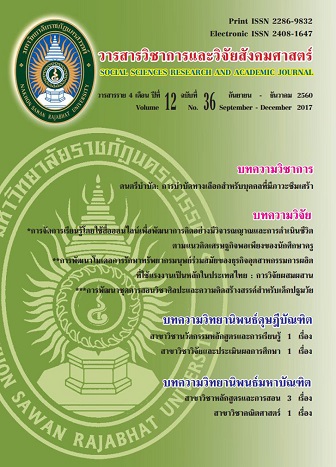การจัดการเรียนรู้โดยใช้สื่อออนไลน์เพื่อพัฒนาการคิดอย่างมีวิจารณญาณ และการดำเนินชีวิตตามแนวคิดเศรษฐกิจพอเพียงของนักศึกษาครู; Learning Management by Using Online Media for Developing Critical Thinking, and Way of Life in Accordance with Sufficiency Economy
Main Article Content
Abstract
The purposes of this research were to study the effect of learning management by using online media for developing critical thinking and way of life following sufficiency economy of teacher students. The sample were the students at the Faculty of Education, Chiang Rai Rajabhat University who enrolled in the course of Instructional Management for Thinking Process. Research instruments were lesson plans using online media, critical thinking evaluation form, report of using revenue – expenses account and learning log. The data were statistically analyzed using mean, standard deviation, t-test dependent and the qualitative analysis.
The results of the study found that after learning by using online media, the average score of critical thinking was 25.24 respectively which was higher than the score before teaching 18.96 the statistically significant level of .001. The opinions of students toward way of life following sufficiency economy of the teacher student tended to confident. By way of life following sufficiency economy, the students agreed that they could learn to control their expenses discreetly and consume moderately by making revenue - expenses account. They spent life rationally by collecting data around and analyze them before making decisions. Also, they could demonstrate ways to solve the problems creatively by carefully considering the cause and effect of things. Furthermore, the students could learn about risk management that they have to prepare themselves for the likely impacts and changes coming to their life. For example, to prevent an insufficient of resources in the future, they had saved the electricity, the water, the gas, etc. Similarly, they had planned to do exercise, eat healthy food, and take more rest; to avoid illness. Besides, the student mentioned that the teaching method of this course could substantially improve their thinking process; such as think positively, listen deeply, live consciously to handle with troubles or problems in life. Also, they strongly intend to employ this method for their effective teaching in the future.
การวิจัยครั้งนี้มีวัตถุประสงค์เพื่อศึกษาผลของการจัดการเรียนรู้โดยใช้สื่อออนไลน์เพื่อพัฒนา การคิดอย่างมีวิจารณญาณ และการดำเนินชีวิตตามแนวเศรษฐกิจพอเพียงของนักศึกษาครู กลุ่มตัวอย่าง ได้แก่ นักศึกษาคณะครุศาสตร์ มหาวิทยาลัยราชภัฏเชียงราย ที่ลงทะเบียนเรียนรายวิชาการจัดการเรียนรู้เพื่อพัฒนากระบวนการคิด เครื่องมือที่ใช้ ประกอบด้วย แผนการจัดการเรียนรู้โดยใช้สื่อออนไลน์ แบบวัดประเมินการคิดอย่างมีวิจารณญาณ รายงานความคิดเห็นจากการทำบัญชีรายรับ–รายจ่าย และบันทึกผลการสะท้อนความรู้สึกหลังการเรียนรู้ วิเคราะห์ข้อมูลโดยการหาค่าเฉลี่ย ส่วนเบี่ยงเบนมาตรฐาน การทดสอบค่าที (t-test dependent) และการวิเคราะห์ข้อมูลเชิงคุณภาพ ผลการวิจัยพบว่า นักศึกษาครูมีคะแนนเฉลี่ยการคิดอย่างมีวิจารณญาณหลังการเรียนรู้เท่ากับ 25.24 ซึ่งสูงกว่าก่อนเรียนที่มีคะแนนเฉลี่ยเท่ากับ 18.96 อย่างมีนัยสำคัญทางสถิติที่ระดับ .001 และนักศึกษาครูมีความคิดเห็นต่อการดำเนินชีวิตตามแนวเศรษฐกิจพอเพียงหลังการจัดการเรียนรู้โดยใช้สื่อออนไลน์ในด้านบวก โดยมีความคิดเห็นว่าการเรียนรู้ในรายวิชาและการทำบัญชีรายรับ-รายจ่ายทำให้นักศึกษารู้จักควบคุมการใช้จ่ายและมีเหตุผลในการดำเนินชีวิต ประจำวัน เช่น รู้จักรวบรวมข้อมูล วิเคราะห์ข้อมูลก่อนตัดสินใจเชื่อ รู้จักคิดแก้ปัญหาที่เกิดขึ้นอย่างสร้างสรรค์ และมีภูมิคุ้มกันที่ดีในตัว นอกจากนั้นยังได้ฝึกการพัฒนากระบวนการคิดของตนให้เป็นไปในทางที่ถูกต้อง เพื่อเป็นเกราะป้องกันตนเองจากภัยคุกคามหรือปัญหาต่างๆ รวมทั้งได้แสดงความเห็นว่า จากกิจกรรมการเรียนรู้โดยใช้สื่อออนไลน์ช่วยให้นักศึกษาเห็นความสำคัญของข้อมูลที่ปรากฏในสื่อออนไลน์ที่ทุกคนเข้าถึงได้ง่าย ได้ตระหนักถึงคุณค่าของการใช้ข้อมูลจากสื่อให้เกิดประโยชน์มากขึ้น ทั้งประโยชน์ต่อตนเองและต่อการนำไปใช้เป็นแนวทางจัดกิจกรรมการเรียนรู้ต่อไป

